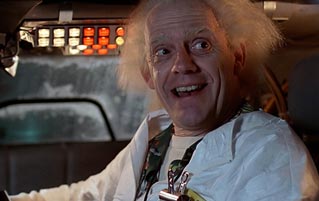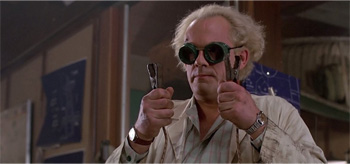5 Dumb Things Hollywood Apparently Believes About Scientists

Is there any group more misunderstood by Hollywood than scientists? I mean, yeah. Of course. Tons. That's kind of a silly question. But the point is that movies often get scientists wrong. Not a little wrong, like confusing Joel Kinnaman with Bert from Sesame Street. Movies are wrong about fundamental things like what scientists do, why they do it, and whether they wear lab coats while working on their computers.
If Magic Were Real, Scientists Would Ignore All The Evidence Until They Met An Ironic End At Its Hands
Fantasy movies usually need a scientist to be skeptical about whatever the fantastical premise is. Teens are casting magic spells, people are rising from the dead, or computers have decided they hate us now. But they don't just have a healthy dose of skepticism, they stick to their skeptical guns despite any amount of evidence to the contrary. A dragon breathes fire at them? Swamp gas. Aliens start probing them? Must have eaten something weird. They're the ones screaming, "If we didn't learn it in grad school, it doesn't exist!" as magically levitating zombies tear them limb from limb.

But science isn't a stuffy old set of rules to be followed dogmatically. In fact, being anti-dogma is science's "thing." Science is a set of methods for determining what's likely to be true based on what's repeatable. If you can reliably predict an outcome, you're doing science, baby. We didn't stop reading tea leaves because they clashed with our new Bunsen burner set, we stopped reading them because they didn't have reproducible effects.
If someone could wave a stick, say some words in pseudo-Latin, and levitate a book from across the room, scientists wouldn't be all, "I refuse to believe the overwhelming evidence that this is very clearly true. Now let's stop talking about it and grab those beakers so we can confirm things we already know."

They would be the people most psyched about it. Generally, people don't become scientists because they hope we never discover anything new. They dream of discovering something a millionth as interesting as a stupid spell that waters your plants while you're on vacation. Any scientist worth their salt would kill for the chance to understand this somehow completely undiscovered force. Plus, they could win every single Nobel Prize for the next hundred years.
If magic operates by any set of rules, then it's repeatable and a new branch of science. Dissertations would be written about the exact angle a wand needs to wave in order to make a book talk and Apple would be developing a demon-powered Apple Watch ... You'd still have to get a new adapter for the watch, made of basalt and failed dreams, but it would have 30 percent longer battery life.
Famous Scientists Are Given Carte Blanche To Do Whatever They Want
"We just came down to see what you're doing with all our money!" is something you say to your kid when you visit them at college. It is not something anyone has ever said to a scientist in charge of a multi-million dollar project.
Whether they are developing a super soldier serum or genetically crossing wolves with bullets, movie scientists appear to run labs with dozens of employees, squads of inept security guards, and zero oversight. No doubt, one of the perks of working in academia is that you have fewer people breathing down the neck of your tweed lab coat. But giving someone a multi-year project and not scheduling any intermediate deliverables is simply bad management.
More than that, scientists often seem like they haven't even told the people funding them what the hell they're working on. It's as though they literally said, "Cut me a check and I will science you up something useful," and then were buried under a mountain of funding.

"Yes, yes, Skynet blah blah enslave humanity. When does this lead to us getting the sex droids?"
Unfortunately for people seeking deep truths about the universe, and for people seeking bullet-wolves, scientists have to fight fang and rifling for their funding -- at least in the West. And that fight looks like it's only going to get more desperate under the current administration.
Like any endeavor humans care about, it's competitive. In movies, they have no-questions-asked funding, as though they had an independent source of seemingly unlimited funding that had nothing to do with the rest of the movie and was never explained. Like if there were scientists in Wes Anderson movies.
They Have Dangerous Labs In Their Houses
To a good scientist, a lab is anywhere you can perform carefully controlled experiments, gather your data, and analyze them. To a movie scientist, it's anywhere with glass beakers and enough room to build overly elaborate Rube Goldberg machines to butter your toast. And while your house is a very convenient place to store Technicolor liquids that you've inexplicably chosen to light as though they're at a nightclub with velvet drapes, it isn't a great place for controlled experimentation.
Admittedly, there is some home experimentation going on these days, but it's mostly YouTubers giving demonstrations of high school science concepts and hobbyists messing with gear they can afford to break. Cutting-edge science is almost exclusively done in places with a little more control over the environment. That's because knowledge is power. More specifically, the knowledge that Doc Brown keeps plutonium in his house -- that a local teenage boy has free access to -- is terawatts of power.

If there's anyone who understands the dangers of the materials being used in an experiment, it's the highly knowledgeable, top-of-his-field scientist that is doing the research. And yet Dr. Flubber leaves explosive reagents next to a sentient exception to the conservation of energy ... Few people realize that Flubber is actually the doctor's name.
Love Of Their Work Blinds Them To Any Ethical Implications
Yes, there definitely are historical examples of scientists doing messed up things in the name of science. OK, there are a lot of them. Really. No shortage. Think I'm done? Nope. And I don't think I even covered Nazis in there.
But keep in mind that these incredibly fucked up experiments are typically performed in a context where fucked up actions is the dish du jour. Yes, Nazi scientists performed a bunch of horrific experiments (OK, understatement) but their defining characteristic wasn't that they were scientists, it was that they were Nazis. In fact, non-Nazi scientists are often at the forefront of conversations about the ethical implications of their work. That's because it's their legacy. And they care way more about that shit than the Joe over the sum of all Joes.

Robert Oppenheimer, father of the atomic bomb, famously campaigned for nuclear disarmament. Da Vinci may have intentionally put flaws into his designs for war machines so that people wouldn't actually use them. Dr. Oz keeps secret the formula for the weapons-grade bullshit he says on his show.
I don't mean in any way to excuse the monstrous experiments done on prisoners, the disabled, orphans, women, minorities ... basically, anyone that couldn't be mistaken for a President at some point. But those horrible things occurred because the citizenry viewed a large swath of the population as not fully people. Regular, non-science folk were just as likely to be horrible monsters, science was simply turbo-charging the monster agenda.
So the scientist who only cares about their work, ethics be damned, shouldn't be any more of a trope than the guy who makes windshield wipers, ethics be damned. Or the guy who goes to ballgames, ethics be damned.
Scientists Know All Science
Movies tend to treat scientists like they treat minorities: There's at most one of them in the movie, they probably aren't ending up with the romantic lead, and they're used as a stand-in for a wide range of diverse backgrounds.
In Batman Begins the main thing we know about Lucius Fox's scientific background is that he helped Bruce Wayne's father build Gotham's train system. That could mean he studied a lot of different things but "antidotes to psychoactive drugs" isn't likely to be one of them. Unless some component of Gotham's public transit system involved psychoactive drugs.

And yet when Scarecrow's fear toxin threatens the city, he whips up a cure like he used to teach "Cures For Fear Gas" at Gotham U. It's like if you had a Cambodian character come across a riddle in Japanese and they were all like, "I'll take care of this!"
Hollywood also acts like once a scientist makes their discovery -- that the solution to the equation was in them all along -- then we're only moments away from a great implementation of that discovery. In reality, the difference between a discovery and great implementation is the difference between your stoned friend saying, "You know what would make a great movie?" and Inception.

Engineering isn't some afterthought done by second-string scientists hammering out the details that the real talent is too busy for. Everything that works well has a good deal of engineering behind it. My damn liquid soap dispenser is specifically designed to pump the right amount of soap of a given viscosity. Fill it with the cheaper soap and it squirts out at you like you're playing a practical joke on yourself for the next month. Every sufficiently complex project has unforeseen problems. If you don't take that into account, you end up with a cure for a zombie outbreak that can only be manufactured as a suppository.
Having super smart scientist characters is cool and fun and I'm all for it. But making someone such a good particle physicist that they know organic chemistry is like having a character that's such a good race car driver they can fly a helicopter.
Do not click this link.
For more check out 4 Things Movies Always Get Wrong About Computer Hackers and 5 'Scientific' Movies That Actively Hate Science.
And be sure to check out 9 Types Of Coworkers To Make You Want Your Head To Explode, and let us know about other headsplosion-worthy employees we may have missed.
Also follow us on Facebook. You'll be glad you did.